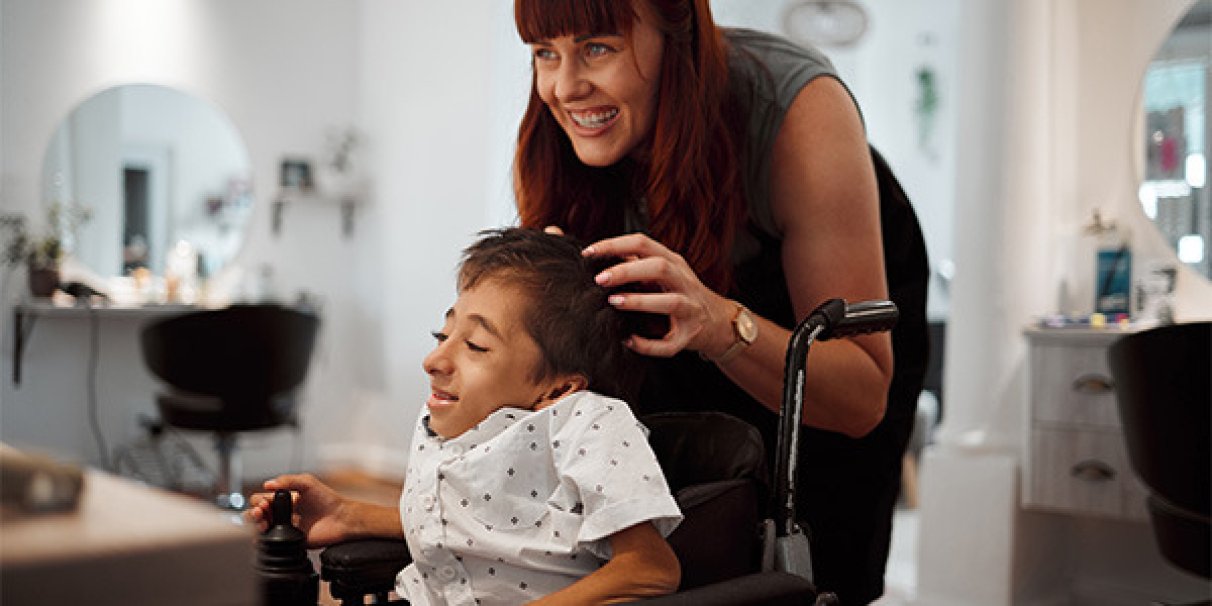How to Communicate with Someone with an Intellectual Disability in a Hair Salon

Communicating with people with an intellectual disability can be a unique challenge, but it’s important to remain patient, friendly, and respectful. As a hairdresser, you have the opportunity to provide a pleasant experience and ensure the customer feels at ease. Here are some tips for how to communicate and create a good atmosphere for customers with an intellectual disability in your salon:
-
Treat Everyone with Respect The foundation of any interaction, regardless of the situation, is respect. Always treat a customer with an intellectual disability as a full adult or child, depending on their age. Speak directly to the person, not to a caregiver, unless necessary. This makes the customer feel taken seriously and promotes a positive experience.
-
Use Simple and Clear Language People with an intellectual disability may not understand complex sentences or jargon. Use short, clear sentences and avoid complicated terms. Instead of saying, "Shall we start with texturizing the hair ends?" you might say, "Shall I cut the ends of your hair?"
-
Provide Visual Cues In addition to verbal communication, visual cues can help the customer better understand what will happen. For example, show the customer which scissors you will use or what the hairbrush looks like. This can help reduce uncertainty and anxiety.
-
Be Patient and Take Your Time It may take longer for someone with an intellectual disability to understand what you mean or make a decision. Be patient and give the person time to respond. Avoid rushing or putting pressure on them, as this can cause stress.
-
Pay Attention to Body Language People with an intellectual disability might find it harder to express themselves verbally. Pay close attention to their body language to understand how they are feeling. If the customer seems tense or uncomfortable, try to ease the situation by taking a break or explaining things calmly.
-
Ask for Confirmation If you’re unsure if the customer understands what you’re saying, ask for confirmation. Use simple questions like, “Is this okay?” or “Would you like me to do it this way?” This gives the customer the chance to clearly state their preferences without feeling pressured.
-
Avoid Patronizing While it may be tempting to be extra caring, it’s important not to come across as patronizing. Don’t talk to adults in a childish manner, and avoid using exaggerated tones or gestures. Aim for a balance between helpfulness and respect for the customer’s independence.
-
Create a Calm Environment A busy or noisy salon can be overwhelming for someone with an intellectual disability. If possible, try to create a calm environment where the customer can feel more comfortable. Reduce distractions and try to keep the treatment calm and relaxed.
-
Communicate with the Caregiver or Support Person (if needed) Sometimes it’s useful to seek advice from a caregiver or support person, especially if the customer has difficulty expressing preferences. However, ensure you still speak directly to the customer and involve them in the communication. This can help build the customer’s confidence in the situation.
-
Offer Reassurance Some people with an intellectual disability may be nervous about new experiences, such as visiting the hairdresser. Offer reassurance by explaining what you are doing and why. For example, say, “I’m going to wet your hair now; it might feel a bit cold, but it will be over quickly.”
-
Be Flexible and Adapt Every person is different, and the same goes for those with an intellectual disability. What works for one customer may not work for another. Be flexible in your approach and try to adapt to the customer’s needs and behavior.
-
Provide Positive Feedback and Compliments Give positive feedback and compliments. This can help make the customer feel at ease and boost their confidence. A simple “You’re doing great!” or “Your hair looks fantastic!” can make a big difference.
Conclusion By communicating patiently, clearly, and respectfully, you can ensure that customers with an intellectual disability feel welcome and understood in your salon. Paying active attention to their needs and creating a pleasant, calm environment contributes to a positive experience that encourages them to return.







Comments : 0